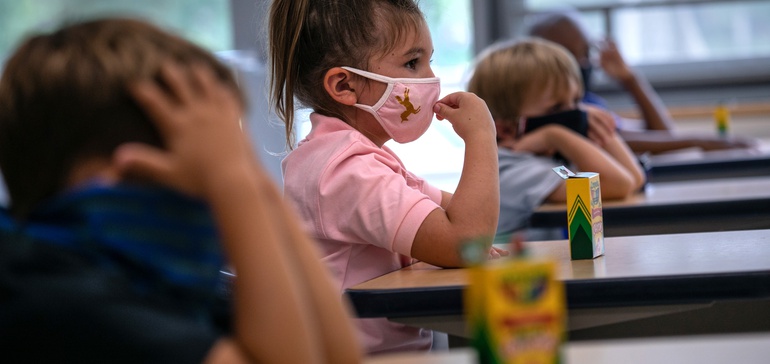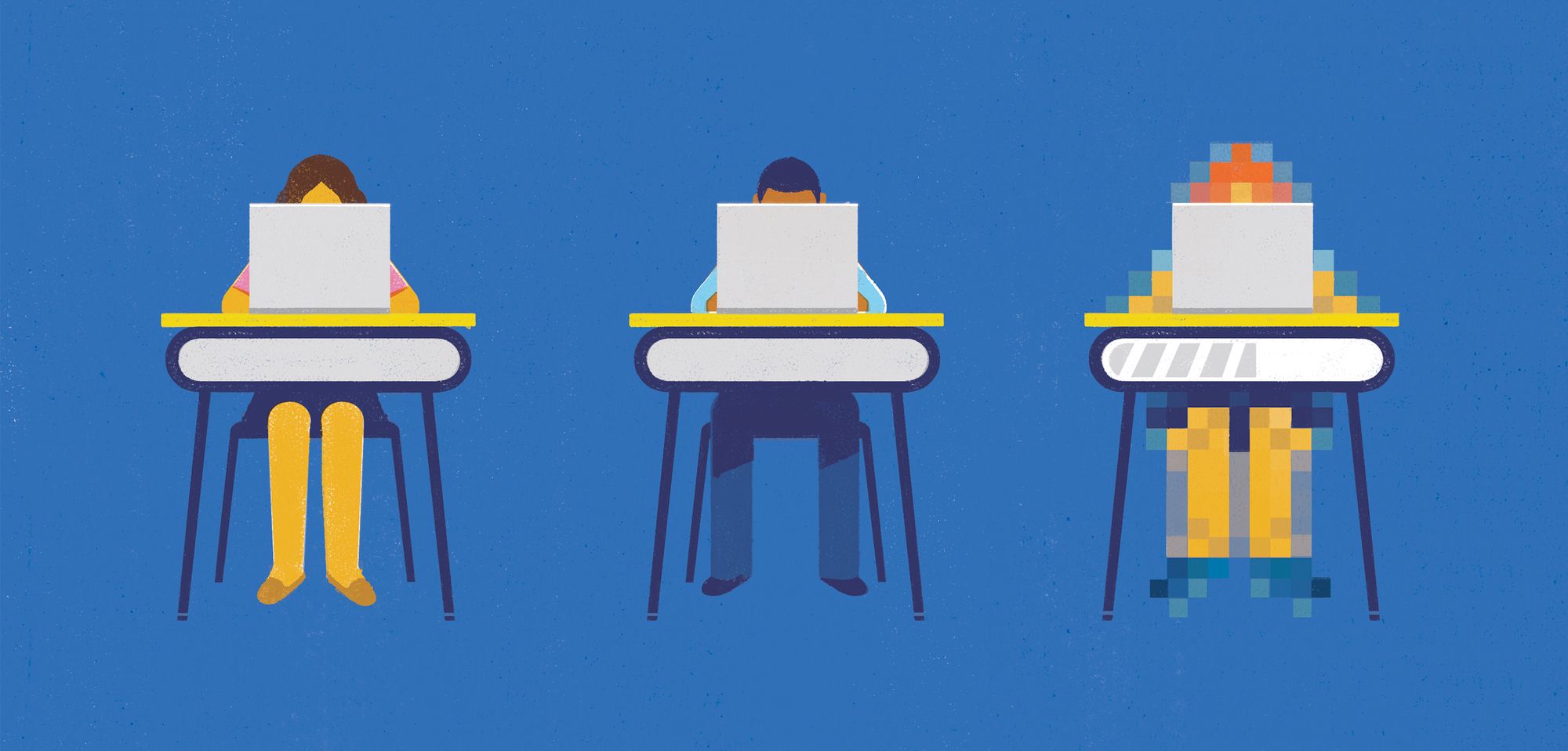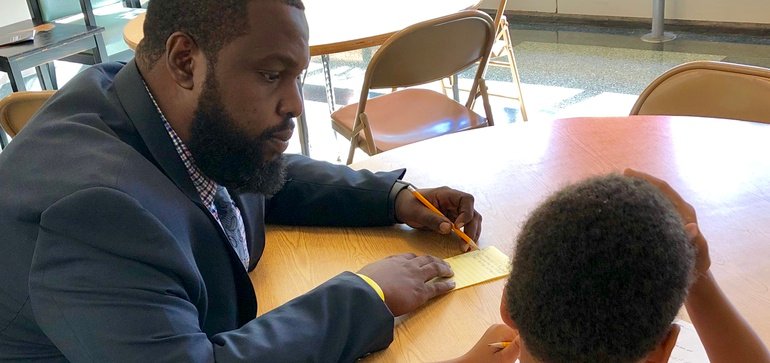Concerns about bullying, anxiety follow loosening of mask mandates
School leaders ask for respect for individual masking choices as more communities make masks optional.
As COVID-19 cases continue to decrease, school systems are urging compassion and understanding for staff and students who choose to continue to wear face masks even if the district has dropped its masking requirements.
While many are eager to see the smiles behind the masks in schools again, school leaders, some of whom spent the past two school years responding to mask protests and litigation, are acknowledging not everyone will make an easy transition to maskless campuses — and some are upset about the change.
In a Tuesday letter to families, Mathis Calvin III, superintendent of Oswego City School District in New York, said students and staff will have the choice of wearing masks in schools and on school buses starting the next day. Some will choose to continue to wear masks, some will choose not to, and others will be unsure, the letter stated.
“Please know, bullying or harassment related to one’s choice of whether to wear a mask or not will not be tolerated,” Calvin wrote.
In Michigan, Trenton Public Schools Superintendent Douglas Mentzer wrote in a Feb. 21 letter to staff and families that after the district relaxed its mask mandate the week before, there was a mix of emotions.
“As some rejoiced after waiting almost 6 months for the rescission, others were saddened and caught off guard,” Mentzer wrote. “For that, I would ask that we all are reminded of the necessity of kindness, compassion, and grace. We must get through this together.”
In the last month, many states and districts with mask requirements, such as New York, Maryland and Charlotte-Mecklenburg Schools in North Carolina, have announced plans to make masks optional.
According to Burbio, a data company tracking mask policies in the country’s 500 largest school districts, 57.2%, or 286 of those districts, did not require masks as of Thursday afternoon. That has increased from data recorded Feb. 4 showing 35.2%, or 176 districts, did not require masks.
In a Feb. 27 email, Burbio said it expects the number of mask-optional districts to accelerate in the coming weeks.
“We have to ensure that our kids are able to be set up for success, to be kind to others and empathetic to others’ choices, and respectful of those choices.”
Jessica Dirsmith
Clinical assistant professor of school psychology at Duquesne University
Contributing to this trend is the recommendation from the Centers for Disease Control and Prevention that school systems in areas with low to medium coronavirus spread can relax masking requirements. According to a tweet Thursday from CDC Director Rochelle Walensky, 90% of the nation’s population are in localities with low to medium COVID-19 community levels.
While the trend is moving toward widespread mask-optional rules, some districts are cautioning their communities that masks may be required in the future. The City of Philadelphia, for example, will end mandatory masking in schools March 9 if community COVID-19 levels remain low, but it will require masks for the week following spring break to avoid a post-break surge in cases.
A teachable moment
Emphasizing the need to respect individuals’ mask-wearing choices is one way school leaders can help their communities adjust to changing policies, school psychology experts say.
Jessica Dirsmith, a clinical assistant professor of school psychology at Duquesne University in Pittsburgh, who also works as a consultant to several school districts, said schools can be proactive by being explicit with this messaging through professional development and in classroom lessons.
“We have to ensure that our kids are able to be set up for success, to be kind to others and empathetic to others’ choices, and respectful of those choices,” Dirsmith said.
She also recommends school staff recognize when students are being kind and understanding to those choosing to wear masks even when they are not required. Dirsmith said using social stories with visual or audio narratives of social situations can help students with autism better understand the changes in policies.
Peter Faustino, a school psychologist who serves as New York state delegate to the National Association of School Psychologists, said school systems need to be prepared to respond to bullying or harassment if they occur.
School staff should also recognize there may be heightened anxiety about removing masks in schools. For students struggling with those feelings, gradual exposure to maskless situations could help with that adjustment, Dirsmith said.
Faustino suggests parents and school staff support either mask-wearing or maskless students by helping them prepare short responses to questions or comments they may receive.
These proactive strategies can be teachable moments, Dirsmith and Faustino both said. “I think we work really hard at multiple levels to create schools that are safe environments and communities of learning, so I think we believe this is just one more change that our schools will rise to meet,” Faustino said.
“School is a lot about culture and the culture that is established by you and the educators in that building.”
Darin Loepker
Principal of Shiloh Middle School in Shiloh, Illinois
Masks became optional at Shiloh Middle School in Shiloh, Illinois, earlier last month. Since then some students and staff have continued to wear masks, said Principal Darin Loepker, who says he wears a mask when outside his office.
opponents and advocates. Those opposing mask requirements argue their children’s constitutional rights are being violated. Those in favor of mask mandates call the precaution necessary to protect and accommodate students and staff with vulnerable health conditions.

The ACLU has, with disability rights advocacy groups, sued several states in opposition to their bans on mask mandates, alleging those policies exclude from public school students susceptible to severe illness from COVID-19, in violation of the Americans with Disabilities Act and Section 504 of the Rehabilitation Act, a federal law that protects students with disabilities from discrimination based on their disability.
The U.S. Department of Education’s Office for Civil Rights is investigating seven states — Florida, Iowa, Oklahoma, Tennessee, South Carolina, Texas and Utah — for their statewide prohibitions on mask mandates. The investigations are looking into whether those policies violated Section 504.
If COVID-19 cases continue to decrease and more of the population lives in low- to moderate- risk areas, fights and disputes over masking will likely dissipate, said Jose Martín, an attorney with the Richards, Lindsay & Martín law firm in Austin, Texas, which represents school districts. Martín says his advice to clients is to look at the data for COVID-19 community levels when setting masking policy. In areas with low to moderate levels, it will be harder to justify mask requirements, he said.
“If CDC concludes that the combination of the metrics puts you at low risk, I don’t know that I’m going to want to be in for the political fight on the masks when it doesn’t seem that the risk is that high, right?” Martín. “So I suspect you’re going to see an easing of these disputes.”
Source: https://www.k12dive.com/news/concerns-about-bullying-anxiety-follow-loosening-of-mask-mandates/619813/




